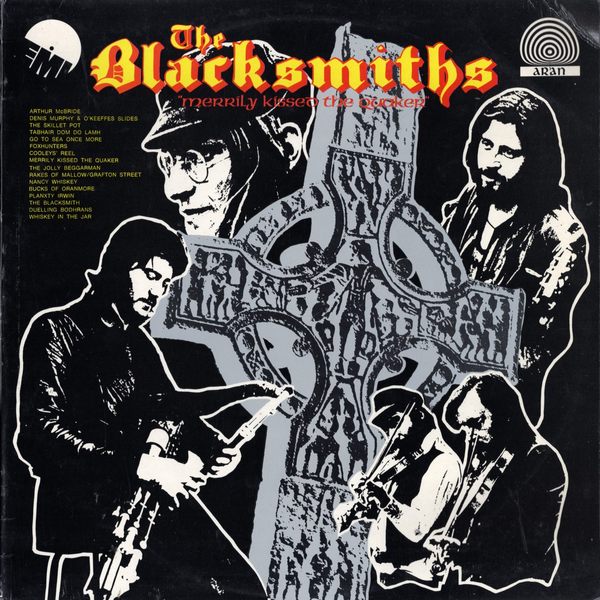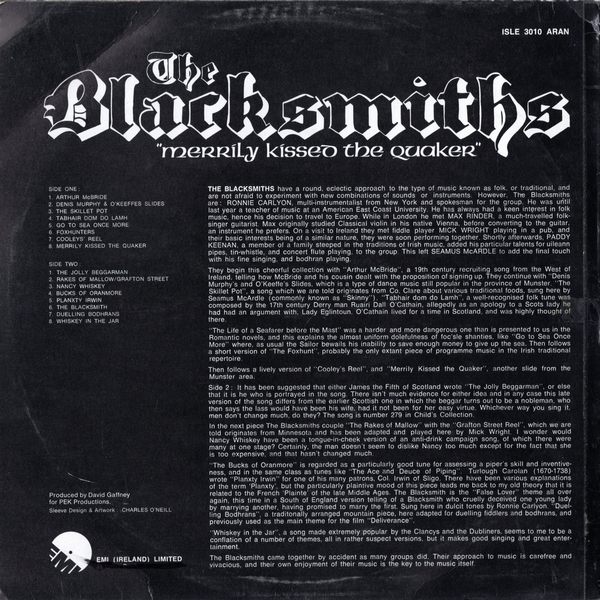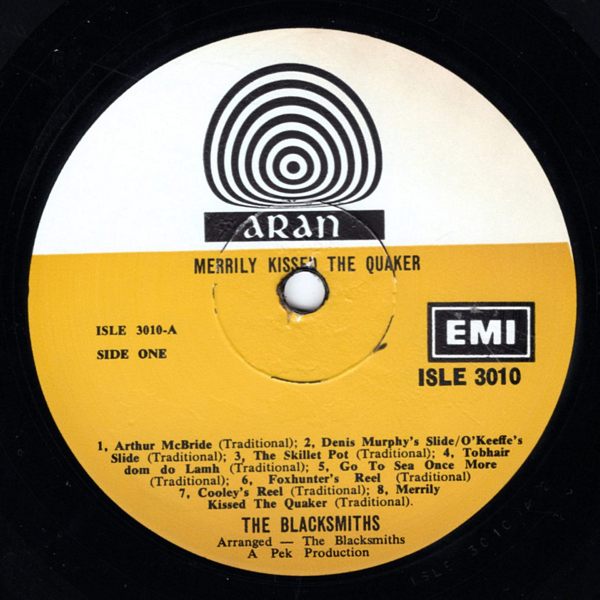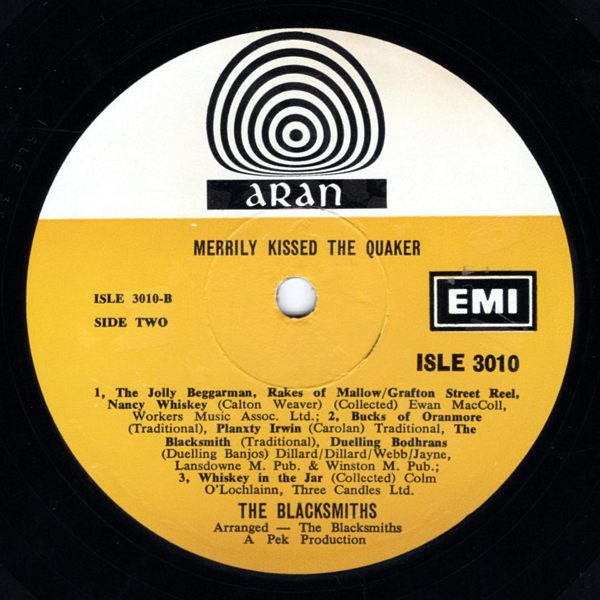
 |


 |
Sleeve Notes
The Blacksmiths have a round, eclectic approach to the type of music known as folk, or traditional, and to experiment with new combinations of sounds or instruments. However, The Blacksmiths are RONNIE CARLYON, multi-instrumentalist from New York and spokesman for the group. He was until last a teacher of music at an American East Coast University. He has always had a keen interest in folk hence his decision to travel to Europe. While in London he met MAX RINDER, a much-travelled folk-guitarist Max originally studied Classical violin in his native Vienna, before converting to the guitar, an instrument he prefers. On a visit to Ireland they met fiddle player MICK WRIGHT playing in a pub, and interests being of a similar nature, they were soon performing together. Shortly afterwards, PADDY KEENAN. a member of a family steeped in the traditions of Irish music, added his particular talents for uileann pipes, tin-whistle, and concert flute playing, to the group. This left SEAMUS McARDLE to add the final touch with his fine singing, and bodhrán playing.
They begin this cheerful collection with "Arthur McBride", a 19th century recruiting song from the West of Ireland telling how McBride and his cousin dealt with the proposition of signing up. They continue with "Denis Murphy's and O'Keeffe's Slides, which is a type of dance music still popular in the province of Munster. "The Skillet Pot", a song which we are told originates from Co. Clare about various traditional foods, sung here by McArdle (commonly known as "Skinny"). "Tabhair dom do Lamh", a well-recognised folk tune was composed by the 17th century Derry man Ruairi Dall O'Cathain, allegedly as an apology to a Scots lady he had had an argument with, Lady Eglintoun. O'Cathain lived for a time in Scotland, and was highly thought of there.
"The Life of a Seafarer before the Mast" was a harder and more dangerous one than is presented to us in the Romantic novels, and this explains the almost uniform dolefulness of foc'sle shanties, like "Go to Sea Once More" where, as usual the Sailor bewails his inability to save enough money to give up the sea. Then follows a short version of "The Foxhunt", probably the only extant piece of programme music in the Irish traditional repertoire.
Then follows a lively version of "Cooley's Reel", and "Merrily Kissed the Quaker", another slide from the Munster area.
Side 2: It has been suggested that either James the Fifth of Scotland wrote "The Jolly Beggarman", or else it is he who is portrayed in the song. There isn't much evidence for either idea and in any case this late of the song differs from the earlier Scottish one in which the beggar turns out to be a nobleman, who says the lass would have been his wife, had it not been for her easy virtue. Whichever way you sing it, men don't change much, do they? The song is number 279 in Child's Collection.
In the next piece The Blacksmiths couple "The Rakes of Mallow" with the "Grafton Street Reel", which we are originates from Minnesota and has been adapted and played here by Mick Wright. I wonder would Nancy Whiskey have been a tongue-in-cheek version of an anti-drink campaign song, of which there were many at one stage? Certainly, the man doesn't seem to dislike Nancy too much except for the fact that she is too expensive, and that hasn't changed much.
"The Bucks of Oranmore" is regarded as a particularly good tune for assessing a piper's skill and inventiveness, and in the same class as tunes like "The Ace and Deuce of Piping". Turlough Carolah (1670-1738) wrote "Planxty Irwin" for one of his many patrons, Col. Irwin of Sligo. There have been various explanations of the term "Planxty", but the particularly plaintive mood of this piece leads me back to my old theory that it is related to the French 'Plainte' of the late Middle Ages. The Blacksmith is the "False Lover" theme all over again, this time in a South of England version telling of a Blacksmith who cruelly deceived one young lady by marrying another, having promised to marry the first. Sung here in dulcit tones by Ronnie Garlyon. "Duelling [sic] Bodhráns", a traditionally arranged mountain piece, here adapted for dueling fiddlers and bodhrán s, and previously used as the main theme for the film "Deliverance".
"Whiskey in the Jar", a song made extremely popular by the Clancys and the Dubliners, seems to me to be a conflation of a number of themes, all in rather suspect versions, but it makes good singing and great entertainment.
The Blacksmiths came together by accident as many groups did. Their approach to music is carefree and vivacious, and their own enjoyment of their music is the key to the music itself.